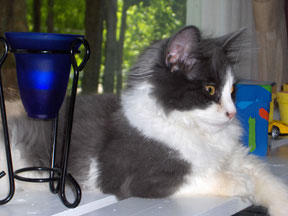Deep Breath
Friday Cat Blogging!

So last Saturday, Jim went out to a movie with the owners of Mr. Picklesworth (sweetest of all sweet cats) while I was at work, and after work we went to their house. Mrs. Owner-Of-Mr.-P has a very green thumb, and as we were leaving she cut me a large sheaf of mock-orange (which had come into full bloom just the day before) and a few peonies the size of your head, all heavily scented: I don't know how she does it, since most everything I try to grow just gives up and dies.
We had been leafing through a plant catalogue earlier in the evening and she asked me about bee balm, because it is also known as bergamot, which is what gives its penetrating scent to Earl Grey tea, of which Jim had procured a pound for Mr. Owner-Of-Mr.-P a few weeks earlier (and also a pound for himself, all delivered by my good friends from Toronto, whose luggage, I expect, still stinks gloriously of bergamot). I was fairly certain that despite the names, the two plants were not the same, and so it proves to be: bee balm is known as bergamot because the leaves of bee balm have a smell resembling that of bergamot, which is a small citrus fruit not eaten but much used for perfumery and flavouring. (In addition to its being found in Earl Grey, it's used in traditional loukoum, aka Turkish Delight, and many commercial fragrances.)
While we are on the subject, "bergamot" is pronounced not in some pseudo French manner to rhyme with "dough", but with the "-t" on the end, to rhyme with "Scot". We got it from the French, who spell it "bergamote", and that "-e" on the end makes all the difference, forcing the pronunciation of the "-t-"; the French got it from the Italians, who call it "bergamotta", and once again the "-tt-" is most definitely pronounced. Isn't is nice to know that despite our language differences, we can all agree on something?
I had, amazingly, never smelled mock-orange before, and yet I knew (from reading about perfumery for years) that mock-orange is also known as syringa. Does that look like anything familiar? Syringa is so named because its stems were once hollowed out and used to make the pipes of the pan-flute known as the syrinx, and nowadays the hollow tubes we use for injecting medicine are, of course, syringes.
The name "peony" isn't quite as interesting, to my mind. It comes to us in English (after a few alterations and dead ends) from Paion, in Greek mythology the physician to the gods, because the seeds of the peony once had medicinal uses. That's it? So straightforward? The French for "peony" is "pivoine", so I thought, okay, maybe something else is related to one of those words; "pavane"? "pivot"? "penis"? "peon"? Anything? Nope. Sometimes a peony is just a peony.

So last Saturday, Jim went out to a movie with the owners of Mr. Picklesworth (sweetest of all sweet cats) while I was at work, and after work we went to their house. Mrs. Owner-Of-Mr.-P has a very green thumb, and as we were leaving she cut me a large sheaf of mock-orange (which had come into full bloom just the day before) and a few peonies the size of your head, all heavily scented: I don't know how she does it, since most everything I try to grow just gives up and dies.
We had been leafing through a plant catalogue earlier in the evening and she asked me about bee balm, because it is also known as bergamot, which is what gives its penetrating scent to Earl Grey tea, of which Jim had procured a pound for Mr. Owner-Of-Mr.-P a few weeks earlier (and also a pound for himself, all delivered by my good friends from Toronto, whose luggage, I expect, still stinks gloriously of bergamot). I was fairly certain that despite the names, the two plants were not the same, and so it proves to be: bee balm is known as bergamot because the leaves of bee balm have a smell resembling that of bergamot, which is a small citrus fruit not eaten but much used for perfumery and flavouring. (In addition to its being found in Earl Grey, it's used in traditional loukoum, aka Turkish Delight, and many commercial fragrances.)
While we are on the subject, "bergamot" is pronounced not in some pseudo French manner to rhyme with "dough", but with the "-t" on the end, to rhyme with "Scot". We got it from the French, who spell it "bergamote", and that "-e" on the end makes all the difference, forcing the pronunciation of the "-t-"; the French got it from the Italians, who call it "bergamotta", and once again the "-tt-" is most definitely pronounced. Isn't is nice to know that despite our language differences, we can all agree on something?
I had, amazingly, never smelled mock-orange before, and yet I knew (from reading about perfumery for years) that mock-orange is also known as syringa. Does that look like anything familiar? Syringa is so named because its stems were once hollowed out and used to make the pipes of the pan-flute known as the syrinx, and nowadays the hollow tubes we use for injecting medicine are, of course, syringes.
The name "peony" isn't quite as interesting, to my mind. It comes to us in English (after a few alterations and dead ends) from Paion, in Greek mythology the physician to the gods, because the seeds of the peony once had medicinal uses. That's it? So straightforward? The French for "peony" is "pivoine", so I thought, okay, maybe something else is related to one of those words; "pavane"? "pivot"? "penis"? "peon"? Anything? Nope. Sometimes a peony is just a peony.

1 Comments:
the Italians call it "bergamotta" as it is believed to have originated from a town called Bergamo.
Post a Comment
<< Home